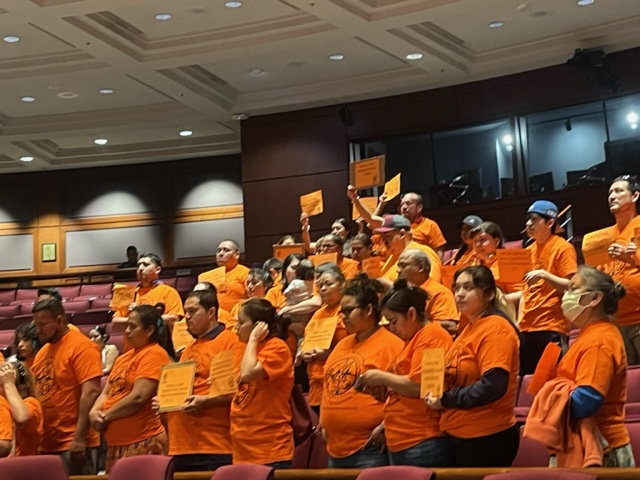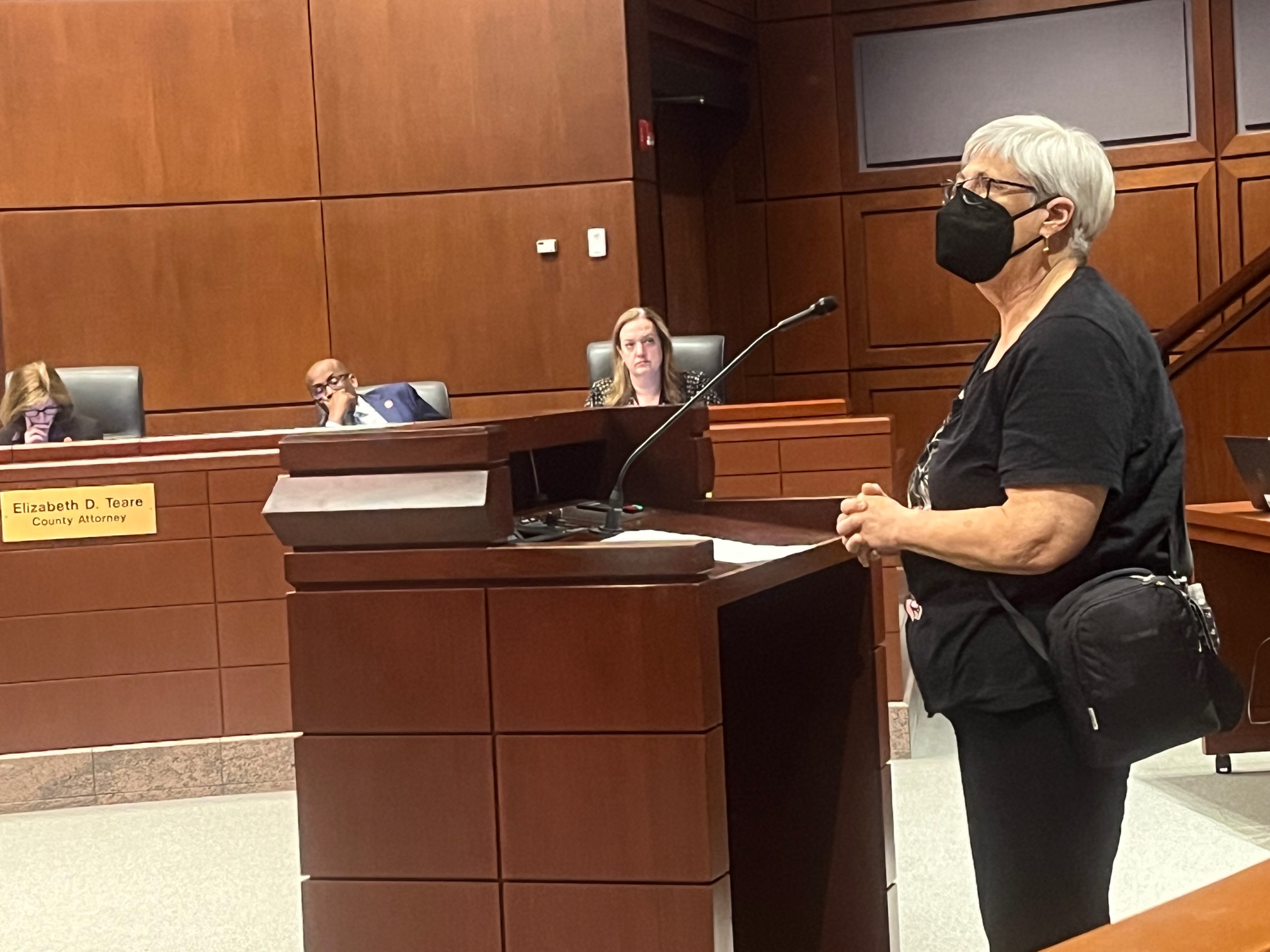The economic impact of the pandemic is not over. The level of need, following cuts in federal rent relief and food assistance, continues to be as high or higher now than during the pandemic, according to testimony by Leah Tenoria, director of Hispanic Ministry and Community Outreach at Good Shepherd Catholic Church
"I have recorded a higher number of calls for assistance each month — double the number from last year at this time — and our funds are out by the 2nd or 3rd day of the month,” Tenoria testified. She oversees the Emergency Assistance Program at Good Shepherd Catholic Church.
 About 80 residents of mobile home parks along Route 1 turned out to the budget hearings.
About 80 residents of mobile home parks along Route 1 turned out to the budget hearings.
Fairfax County Board of Supervisors public hearings were held April 11, 12, and 13 to get public input on the County Executive’s Proposed FY 2024 Advertised Budget Plan, the Advertised Capital Improvement Program for Fiscal Years 2024-2028 with Future Fiscal Years to 2033, and the Current Appropriation Level in the FY 2023 Revised Budget Plan.
“These individuals have already called the county help hotline at CSP (Community Services Program) and are told that they are out of funds or that they no longer have COVID funds to help them," Tenoria said. “We should continue to provide funding to support Emergency Assistance Programs and other support systems that will lift up families and ensure basic needs are met."
One hundred forty-seven people testified during the public hearings. From County School Board Chair Rachna Sizemore Heizer, the first speaker on April 11, to Tenoria on April 12, to Rose James, the final speaker on April 13, they expressed a need and asked for funding or changes to the proposed budget.
Sizemore Heizer said that the School Board appreciated the advertised budget funding for all of Schools' recurring costs that the district requested. She said the division faced a teacher shortage and needed to provide "market competitive compensation."
Lydia Lawrence, chair of the Fairfax Parks Coalition, requested "targeted equity programs” as parks do not look the same, access is not the same, and the "quality of them differs" in different parts of the county. Lawrence requested funds for mobile nature center buses to go into neighborhoods that do not have access to parks, and funding of $229,279 would be for those staff positions. Lawrence said that FCPA desperately needs to hire staff members who have the bilingual capacity and requested $50,000 in translation and interpretation services. She told of an advocate at Burke Lake Park who noticed that most signs were in English. "The sign that was in English and Spanish was a sign for trash. What does that say to our residents?" Lawrence asked.
Arthur Purves, president of the Fairfax County Taxpayers Alliance, said that since FY 2000, the supervisors raised residential real estate taxes three times faster than household income. "If the real estate taxes had increased at the same rate as household income," the rate would be 57 cents instead of $1.11," Purves said.
Rose Risely, a member of the Long Term Care Coordinating Council, asked the board to support funding to staff the Springfield Senior Care Center Without Walls program and that the new positions support the inclusion of adults with disabilities into the program. She asked the board to support the proposed funding increase for the Fastran contract and that human services contracts reflect the consumer price index of 7.3 percent, "which is referenced in county contracts as the basis for
 Kelcy M. Allwein
Kelcy M. Allwein
Mary Paden, chair of the South County Task Force, which advocates for people with low income on the Route 1 Richmond Highway Corridor, testified that the task force organized a block of speakers on behalf of the Fairfax NAACP Housing Committee. Paden described how the county is losing housing “out the back door as rents are increased, and older garden apartments are scheduled for redevelopment "
Mobile home park communities along Route 1 with many tenants, are not all covered by the new no-net-loss policy, and are being bought by out-of-state equity firms, Paden said. "One park located in a future BRT area is ripe for sale to a developer."
"These [mobile home] parks are long standing communities of color ... In its budget guidance, the Board promised $60 million in the FY24 budget for both building and preserving affordable housing, but only about $30M is included in this FY24 budget. We repeat our ask for $60M in the FY24 housing trust fund: $30M for new housing and $30M for preservation. … It is imperative to increase funding now because, after a lull, development pressures are picking up, and we need to be nimble in grabbing opportunities for preservation — or they will be lost forever," Paden said. Paden also repeated a request for a new position in the Department of Housing and Community Development focused on mobile home communities. About 80 residents of mobile home parks along Route 1 turned out to the budget hearings. They asked the county to join with nonprofits in purchasing mobile home parks to save them from being developed.
Other Mount Vernon area issues include funds for home repairs, more rent relief and food assistance for residents still coping with health effects or job hour cuts from the pandemic; a right to counsel in eviction court; and repairs to the Kennedy shelter or alternate housing for people experiencing homelessness until a new shelter is completed in four years.
Therese Chaplin spoke as an individual but is also a member of St. Martin’s Episcopal Church and the NAACP Housing Committee. Chaplin said housing was a life-essential building block, and people of color are disproportionately affected.
She urged the board to mandate a right to counsel in eviction court and fund legal aid attorney positions to meet the need; add funds for rent and food relief;. enable lower-income minority residents to own a home so that they can build intergenerational wealth.
April 28 is the Board of Supervisors Budget Committee meeting for pre-markup. On May 2, the Board of Supervisors adopts the FY 2024 Budget, and on May 25, the School Board adopts the FY 2024 Approved Budget.
